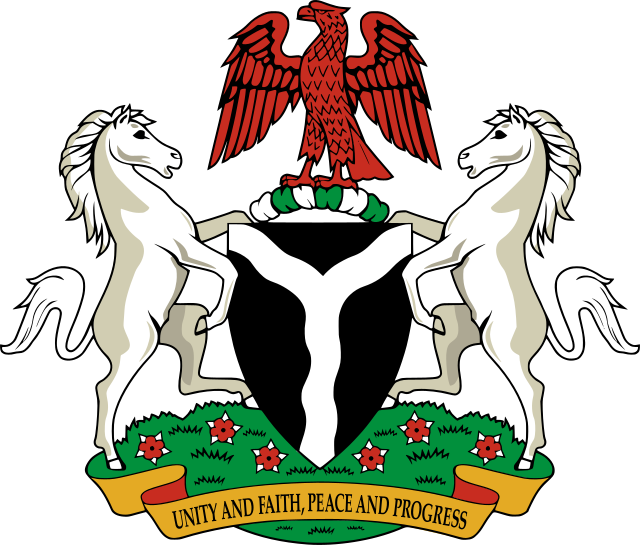Humanitarian Law is defined as laws concerned with or seeking to promote human welfare. These are laws that want to protect and improve the lives and safety of citizens within societies where these laws are codified. The thing about humanitarian laws is that they can be extremely hard to get specific, and therefore can be hard to enforce as seen in the United States. For example, it is easy to put into law that the government will protect the safety of its citizens, but exactly how can be up to interpretation.

Nigerian coat of arms (notice banner)
Nigeria in particular has a constitution dating back to 1999 with the creation of the Fourth Republic that is still ongoing today. The constitution has its humanitarian laws laid out in chapter four. This chapter has 14 sections each dedicated to the description of the general title of each section. They are as follows:
- Right to life
- Right to dignity of human persons
- Right to personal liberty
- Right to fair hearing
- Right to private and family life
- Right to freedom of thought, conscience of religion
- Right to freedom of expressions and the press
- Right to peaceful assembly and association
- Right to freedom of movement
- Right to freedom from discrimination
- Right to acquire and own immovable property
- Compulsory acquisition of property
- Restriction on and derogation from fundamental human rights
- Special jurisdiction and High Court and Legal Aid
As you can see, The Nigerian constitution is an in depth take on human rights that leaves less of an interpretation in practical use and more of an upholding standard for the Nigerian courts.
While battling for independence from the United Kingdoms longtime colonial rule, military conflicts killed many on both sides, but was especially felt for the Nigerian populations. This was a brutal and tragic conflict that ended up resulting in Nigerian independence in 1960, but at a heavy cost.
A more modern example within Nigeria would be the the group of Boko Haram as named by western civilizations, but known to locals and members of the organization as “Jama’atu Ahl as-Sunnah li-Da’awati wal-Jihad” (JASDJ). This is a group of Sunni people calling for a Jihad, or holy war. This would entail replacing the mixed religion government (by constitution a president and vice president must be mixed religion, usually Christian and Muslim as the overwhelming majority of the population falls into those two categories) with just a Muslim government and the eradication of any westerners in the land and western ideologies. This is not just a protest group with powerful words, but an armed and an organized group that has carried out many attacks and atrocities towards civilians over decades. The group has existed in many forms varying in power since 1990. It faced large losses in 2009 when the government went after hundreds of their members and even killed the leader. The second in command Abubakar Shekau took control and sought to rebuild the strength of the organization. Since then, over 35,000 people (with some estimates being upwards of 50,000 people) have been killed by Boko Haram’s attacks and attempts to install their own Islamist state. A specific example would be on April 15, 2014 when the group attacked an all girl’s school and kidnapped 250-300 young girls in a northern state in Nigeria and threatened to sell them off as wives for a ransom. This was under the justification that women should not be taught in schools and had more opposition to western thoughts.

Nigerian soldiers hold up recently seized Boko Haram flag in victory
Nigeria has clearly had many bouts with Boko Haram and is in a long and constant struggle against them. Combine that with general political instability and the group is managing to get by. Other nations, such as the United States and some European powers have offered assistance namely in the hunting down of group members especially when they were aligned with ISIS for a time. Some aftermath affects have been a social discomfort in knowing that any one of these atrocities may happen to you or your children while in a public space. Another factor would be the resentment of the opposing religion as Nigeria has had a long history of religious conflicts that have only more recently (couple decades) settled down where this might be a spark to the continuation of struggles. Overall, Nigeria is overtly aware of this group and the new president that is tied to the military has had actions that has supposedly virtually eliminated this group.
Sources:
https://www.dni.gov/nctc/groups/boko_haram.html
Fundamental Human Rights of A Nigerian and Universal Human Rights
http://genocidewatch.net/page/2/?s=nigeria
https://www.dni.gov/nctc/groups/boko_haram.html
https://www.voanews.com/a/nigeria-army-chief-boko-haram-capabilities-virtually-eliminated/3511656.html
https://civil-protection-humanitarian-aid.ec.europa.eu/what/humanitarian-aid/international-humanitarian-law_en


